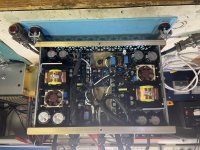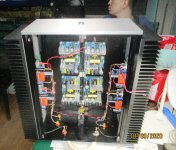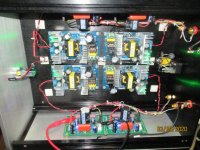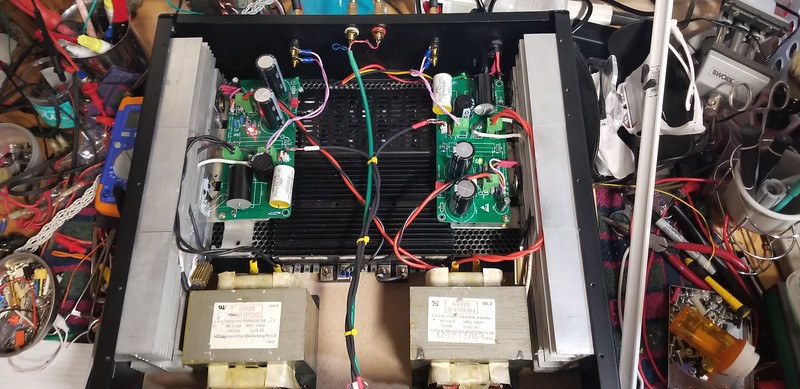Has anyone built a class A amp with SMPS
I thinking of building A LuFo stereo amp with a SMPS
LuFo Amp - 39w SE Class A from 28v Rail
I have a SMPS 30volt(variabel) that can give 10A.
But Im thinkig of the heat it Will generate...
I thinking of building A LuFo stereo amp with a SMPS
LuFo Amp - 39w SE Class A from 28v Rail
I have a SMPS 30volt(variabel) that can give 10A.
But Im thinkig of the heat it Will generate...
Last edited:
So far I have only used switcher on recent diy Class A amplifiers.
They work fine and run cool enough, but you want to think of having
some filtering for the wide band noise they seem to generate.
They work fine and run cool enough, but you want to think of having
some filtering for the wide band noise they seem to generate.
I tried industrial SMPS with F4, DefiSIT and LuFet.
I didn't like them and have switched back to DIYAUDIO standard linear PS.
I didn't like them and have switched back to DIYAUDIO standard linear PS.
I have a F5 with 2 off the shelf SMPS and CLC filtering - works well.
But:
- they will simply shut down on overload
- still had to use a thermistor as inrush limiter
- they will fail sooner
The overload issue and higher failure probability make a speaker protection mandatory in my eyes. I will not use mine with expensive speakers and do believe that the ease of mind with linear supplies is well worth the money.
But:
- they will simply shut down on overload
- still had to use a thermistor as inrush limiter
- they will fail sooner
The overload issue and higher failure probability make a speaker protection mandatory in my eyes. I will not use mine with expensive speakers and do believe that the ease of mind with linear supplies is well worth the money.
I've recently built an M2 clone amp powered by two Meanwell SMPS, housed externally to keep them away from the hi heat area - thinking that they will be more reliable working at ambient temperature. Power is fed to the amp through two cap multipliers.
There's a picture in the Official M2 thread.
.
.
There's a picture in the Official M2 thread.
.
.
To keep the smps cool, yes, i never use fan on the smps.
You are asking about the amp?
Current through the amp is unaffected by the type of power supply you use.
As long as you do not modify the amp it will produce the same heat. If you use fan is up to you.
You are asking about the amp?
Current through the amp is unaffected by the type of power supply you use.
As long as you do not modify the amp it will produce the same heat. If you use fan is up to you.
Several of us on the forum are using or have used SMPS successfully with class a amplifiers.
A quick search in the pictures thread of the Pass sub forum brings up those that have recently done so.
https://www.diyaudio.com/forums/search.php?searchid=25002320
I’m currently listening to an F5 with an SMPS from MicroAudio. I also have had great success with a few class AB builds using SMPS.
And as already pointed out, the ACA and VFET lottery amps use stout SMPS bricks very well, as designed by Mr. Pass.
From series meanwells or laptop bricks to dedicated audio-focused units, it seems that SMPS offer a lot, as long as they are safely implemented and spec’ed for the right voltage and overall power needed.
Ryssen, you may have to experiment with your supply to see if it can accept extra capacitance at the output. If it can supply 30v at 10A continuous, then it should work well. XRK would be able to tell you more about the LuFo requirements.
A quick search in the pictures thread of the Pass sub forum brings up those that have recently done so.
https://www.diyaudio.com/forums/search.php?searchid=25002320
I’m currently listening to an F5 with an SMPS from MicroAudio. I also have had great success with a few class AB builds using SMPS.
And as already pointed out, the ACA and VFET lottery amps use stout SMPS bricks very well, as designed by Mr. Pass.
From series meanwells or laptop bricks to dedicated audio-focused units, it seems that SMPS offer a lot, as long as they are safely implemented and spec’ed for the right voltage and overall power needed.
Ryssen, you may have to experiment with your supply to see if it can accept extra capacitance at the output. If it can supply 30v at 10A continuous, then it should work well. XRK would be able to tell you more about the LuFo requirements.
Last edited:
To add to what VonAh said: The SMPS designed by MicroAudio (Cresnet) are specifically made for audio and utilize a different topology so that they don’t mind having a big cap bank at their output, and he makes special ones designed for continuous high current Class A loads. I find that they work very well and are low noise. On some other brands of SMPS, one has to make special slow start circuits to prevent start up in rush hiccup mode.
@WW: I see you have some Noctua’s strategically placed above the transformer. Are they powered from the SMPS 12v? And is is thermally controlled?
@WW: I see you have some Noctua’s strategically placed above the transformer. Are they powered from the SMPS 12v? And is is thermally controlled?
Last edited:
I used two 19v 4A laptop power supplies to power each channel of an F5 years ago. Worked great. Too bad I traded it away for a refurbed, but non working Dynaco ST70 ...
I am currently building another set of mono F5 now with same 19V power supplies...
I also built the ESP P101 with +/- 60V SMPS and it ranks! One of my faves.
I am currently building another set of mono F5 now with same 19V power supplies...
I also built the ESP P101 with +/- 60V SMPS and it ranks! One of my faves.
My very first class a amp, the aleph mini, used bridged meanwell smps. It’s been making music in the garage for more than a decade.
To add to what VonAh said: The SMPS designed by MicroAudio (Cresnet) are specifically made for audio and utilize a different topology so that they don’t mind having a big cap bank at their output, and he makes special ones designed for continuous high current Class A loads. I find that they work very well and are low noise. On some other brands of SMPS, one has to make special slow start circuits to prevent start up in rush hiccup mode.
@WW: I see you have some Noctua’s strategically placed above the transformer. Are they powered from the SMPS 12v? And is is thermally controlled?
At those prices I do not think they are DIY friendly 🙂
They are pricey and the day I bought mine Sammy was kinda down saying the same thing. To his surprise I bought 2 of them with additional cap banks. I told him not all diy is about saving money, I get an idea of how I want something built and can not purchase them commercially so I have to build it. It still is cheaper than a commercial product. I have fans powered from th 12V isolated plug on the supply through a pcm speed controller, I was wondering if they will introduce and noise into the power supply. Will see probably could get away without them.
Bill
Bill
Last edited:
If you use a CLC filter like 1000uF // 1mH // 1000uF and 50ohm in parallel with 1mH (radial ferrite core) it will stop any fan switch noise from getting back to your PSU.
Sami’s PSU’s are very competitive for OEM (when you get 100). For DIY, they are similar to another popular brand but IMO (based on measurement and listening) quieter and offer more audio specific features. Like no hiccup and auxiliary power for accessories like MCU’s and linear regulated power for preamps. You have to ask yourself how important is having a flat as a board noise background important to you? No mains peaks.
Here is the FFT of the noise floor of my class D amp using one of Sami’s PSU’s:
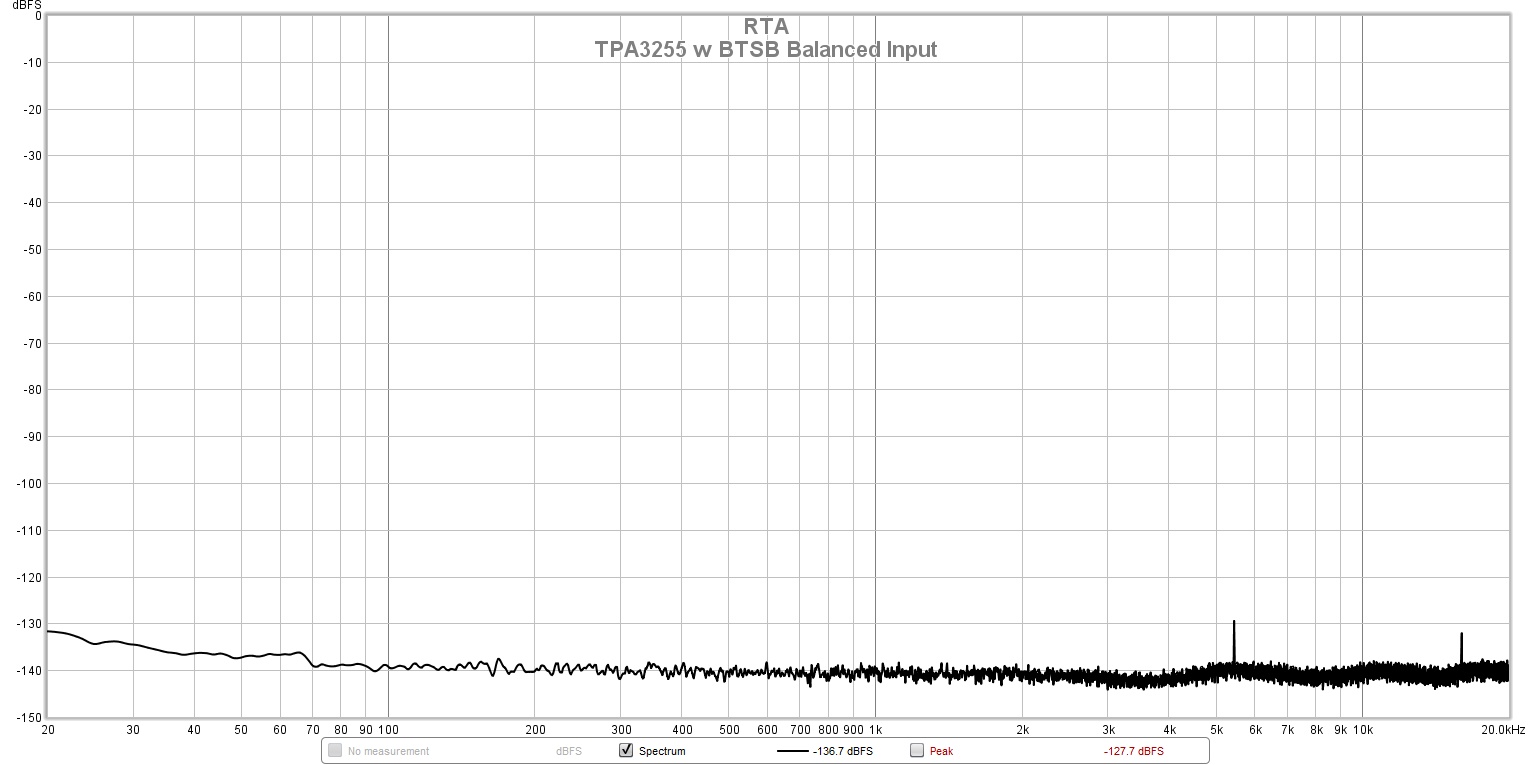
Sami’s PSU’s are very competitive for OEM (when you get 100). For DIY, they are similar to another popular brand but IMO (based on measurement and listening) quieter and offer more audio specific features. Like no hiccup and auxiliary power for accessories like MCU’s and linear regulated power for preamps. You have to ask yourself how important is having a flat as a board noise background important to you? No mains peaks.
Here is the FFT of the noise floor of my class D amp using one of Sami’s PSU’s:
Last edited:
I didn't like SMPS (supposed sonic quality, failing often with disastrous effects...) but was told a lesson on a few of M. Pass Class A builds (amp and preamp) and some Class D. I am quite nick picking when it comes to sound quality, but my conclusion is SMPS with Class A (can equal the best linear or even better them as I found out. Class A with its constant current draw simply cries for it when you look at it - I would probably though be less adamant regarding Class A/B.
And if buying a good brand then in fact there is a lot of safety built in to cope with failures. In the past, SMPS weren't as robust and devices downstream not well protected IMHO. But given the abuse my various MODERN SMPS are taking in the house generaly and with the amps specificaly , I would say I haven't seen anything getting broken nor can say they aren't quite robust today TBH. Meanwell offers excellent specs, excellent quality, excellent choice, excellent protection excellent sound and at a very affordable price and foolproof use. What is it not to like?
The thing is though that if you want the best sound quality of a Meanwell (I haven't tried Sammy's SMPS, but once a Meanwell is appropriately tweaked it leaves very very little room to improve sound quality IMHO, regardess what PS you may consider) you may want to add some additional capacity banks at the output and also some HF filtering. All done very easily and 'Meanwell + few caps + SMPS filter' can give a fantastic PS-combo at a very low price while being very safe to assemble for DIY beginners. On a Class A you can then probably consider the PS topic "done" and focus on tweaking elsewhere.
But again, as said here by others and as detailled in some of my posts (the latest in the VFET thread), there is a significant impact on the sound when adding caps and filters, at least on the devices I built. It is IMHO a must do: don't consider a SMPS done, unless of course you have a already a downstream circuit with excellent power sypply rejection across an extremly wide frequency band (say up to 1MHz)... or of course a non audio device that doesn't really care.
All IME and again from someone who wasn't convinced at all to start with
Claude
And if buying a good brand then in fact there is a lot of safety built in to cope with failures. In the past, SMPS weren't as robust and devices downstream not well protected IMHO. But given the abuse my various MODERN SMPS are taking in the house generaly and with the amps specificaly , I would say I haven't seen anything getting broken nor can say they aren't quite robust today TBH. Meanwell offers excellent specs, excellent quality, excellent choice, excellent protection excellent sound and at a very affordable price and foolproof use. What is it not to like?
The thing is though that if you want the best sound quality of a Meanwell (I haven't tried Sammy's SMPS, but once a Meanwell is appropriately tweaked it leaves very very little room to improve sound quality IMHO, regardess what PS you may consider) you may want to add some additional capacity banks at the output and also some HF filtering. All done very easily and 'Meanwell + few caps + SMPS filter' can give a fantastic PS-combo at a very low price while being very safe to assemble for DIY beginners. On a Class A you can then probably consider the PS topic "done" and focus on tweaking elsewhere.
But again, as said here by others and as detailled in some of my posts (the latest in the VFET thread), there is a significant impact on the sound when adding caps and filters, at least on the devices I built. It is IMHO a must do: don't consider a SMPS done, unless of course you have a already a downstream circuit with excellent power sypply rejection across an extremly wide frequency band (say up to 1MHz)... or of course a non audio device that doesn't really care.
All IME and again from someone who wasn't convinced at all to start with
Claude
- Home
- Amplifiers
- Pass Labs
- Class A amp with SMPS?
